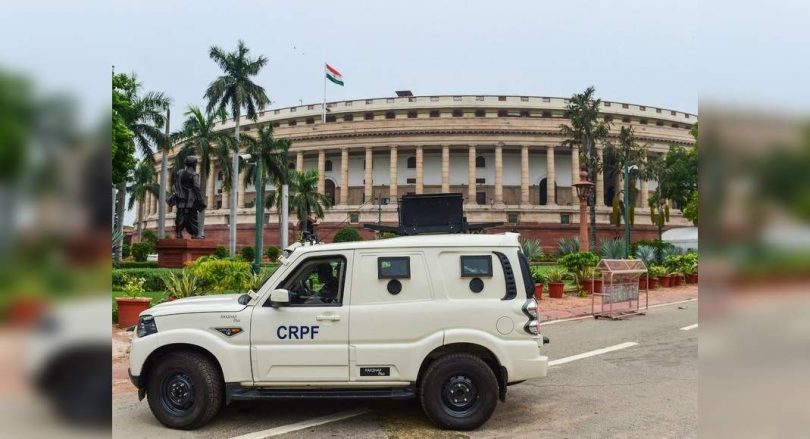NEW DELHI: The government has readied a big legislative agenda for the Monsoon session of Parliament beginning Monday even as the opposition is raring to corner the ruling dispensation over a host of issues including handling of the second wave of Covid-19, rise in fuel prices and farmers’ stir.
Prime Minister Narendra Modi on Sunday told an all-party meeting that the government was ready for a healthy and meaningful discussion on various issues in Parliament, according to Parliamentary Affairs Minister Pralhad Joshi.
An official statement later said the prime minister told the floor leaders that according to the country’s traditions of healthy democracy, issues concerning the people should be raised in an amicable manner and the government should be given an opportunity to respond to these discussions.
Modi said it is everyone’s responsibility to create such a conducive environment and added that people’s representatives truly know the ground-level situation, hence their participation in these discussions enriches the decision-making process.
Upping the ante, several opposition parties were planning to move adjournment notices in both Houses of Parliament on Monday over farmers’ issues.
Opposition parties held a separate meeting after an all-party meet convened by the government on Sunday to discuss their floor strategy.
Many opposition parties will give adjournment notices on the farmers’ issue in both Houses of Parliament, RSP leader N K Premachandran said here after the meeting which was attended by leaders of the Congress, TMC, NCP, CPI(M), CPI, IUML, RSP, Shiv Sena and the AAP.
Farmer union have been protesting on Delhi’s borders since last November against the Centre’s three new agri laws and are also demanding a legal guarantee for Minimum Support Price (MSP).
During the all-party meet, opposition parties objected to the government’s offer for a joint address to all MPs by the prime minister on COVID-19 at the Parliament annexe, saying this will be “highly irregular” at a time when Parliament will be in session and it aims to “bypass” norms.
The meeting was attended by 33 parties.
Leaders, including from the Trinamool Congress (TMC) and the CPI(M), also said that when the pandemic and issues related to it can be discussed on the floor of the House, what was the need to go “outside”.
The annexe is a separate building within the premises of the Parliament complex.
Parliamentary Affairs Minister Prahlad Joshi announced at the meeting that Prime Minister Modi will address MPs of both the Houses — Rajya Sabha and Lok Sabha — on July 20 and speak on the pandemic.
“What is the need to go outside Parliament? Any address should be on the floor of the House,” TMC Rajya Sabha member Derek O’Brien, who was at the meeting, said.
Sources in other opposition parties confirmed that Joshi’s offer has been refused and that some have even suggested a joint sitting of the Houses at Central Hall.
CPI(M) general secretary Sitaram Yechury said that the party’s position has always been that when Parliament is in session, whatever the government has to say, it can do so on the floor of the House.
“It is highly irregular for the government to do this.
When the Parliament is in session, any address or presentation the government wants to make, it has to be done from inside Parliament,” he said.
O’Brien claimed that all opposition leaders present in the meeting, including Leader of Opposition in Rajya Sabha Mallikarjun Kharge, Leader of Congress in Lok Sabha Adhir Ranjan Chowdhury, Samajwadi Party’s Ramgopal Yadav and Bahujan Samaj Party’s Satish Misra refused to be addressed “outside” Parliament.
In another development, various parties, including the Congress and the TMC, on Sunday demanded restoration of MPLAD funds, in an all-party meeting chaired by Lok Sabha Speaker Om Birla, sources said.
Speaker Birla assured them that he will raise the issue with the government and its top functionaries, they said.
The government has listed 17 new bills for introduction in the session.
Three of the bills seek to replace ordinances issued recently.
One of the ordinances issued on June 30, prohibits any agitation and strike by anyone engaged in the essential defence services.
The Essential Defence Services Ordinance 2021 came in the backdrop of the announcement by major federations of the Ordnance Factory Board (OFB) to go on an indefinite strike from the later part of July to protest the government’s decision to corporatise the OFB.
The Essential Defence Service Bill, 2021 has been listed to replace the ordinance, according to a Lok Sabha bulletin issued on July 12.
The Commission for Air Quality Management in National Capital Region and Adjoining Areas Bill, 2021 is another measure that seeks to replace an ordinance.
According to the government, the ordinance was brought to provide a permanent solution and establish a self-regulated, democratically monitored mechanism for tackling air pollution in the NCR and adjoining areas, rather than limited ad-hoc measures.
The Opposition on its part wants raise issues like alleged shortcomings in the healthcare system during the second wave of the coronavirus pandemic and the distribution of COVID-19 vaccines to states.
It would also seek replies on the rising prices of petrol diesel and cooking gas during the session which would end on August 13.
Sources said several opposition parties are also planning to give an adjournment notice over the alleged phone tapping of their leaders.
According to the financial business listed in the bulletin, there would be a presentation, discussion and voting on Supplementary Demands for Grants for the year 2021-22.
There would also be a presentation, discussion and voting on Excess Demands for Grants for the year 2017-18.







